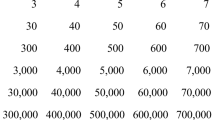Abstract
This paper comments on the global ideas of Moreno-Armella and Sriraman (2005) pertaining to the development of representational systems. The discussion focuses on the co-evolution of symbols and their referents, and the shared interpretation of mathematical symbols in a community of practice. Some future directions are suggested.
This material is based upon work supported by the U.S. National Science Foundation (NSF) under grant no. ESI-0333753. Any opinions, findings and conclusions or recommendations are those of the author and do not necessarily reflect the views of the NSF.
Access this chapter
Tax calculation will be finalised at checkout
Purchases are for personal use only
Preview
Unable to display preview. Download preview PDF.
Similar content being viewed by others
References
Davis, R. B. (1984). Learning Mathematics: The Cognitive Science Approach to Mathematics Education. Norwood, NJ: Ablex.
DeBellis, V. A., & Goldin, G. A. (2006). Affect and meta-affect in mathematical problem solving: A representational perspective. Educational Studies in Mathematics, 63, 131–147.
Goldin, G. A. (1998). Representational systems, learning, and problem solving in mathematics. Journal of Mathematical Behavior, 17(2), 137–165.
Goldin, G. A., & Kaput, J. J. (1996). A joint perspective on the idea of representation in learning and doing mathematics. In L. Steffe, P. Nesher, P. Cobb, G. A. Goldin, & B. Greer (Eds.), Theories of Mathematical Learning (pp. 397–430). Hillsdale, NJ: Erlbaum.
Leder, G., Pehkonen, E., & Törner, G. (Eds.) (2002). Beliefs: A Hidden Variable in Mathematics Education? Dordrecht, The Netherlands: Kluwer.
Lesh, R., & Doerr, H. (Eds.) (2003). Beyond Constructivism: Models and Modeling Perspectives on Mathematics Problem Solving, Learning, and Teaching. Mahwah, NJ: Erlbaum.
Moreno, L. A., & Sriraman, B. (2005). The articulation of symbol and mediation in mathematics education. Zentralblatt für Didaktik der Mathematik (International Reviews on Mathematical Education), 37(6), 476–486, revised version included in the present volume.
Peirce, C. S. (1998). The Essential Peirce: Selected Philosophical Writings, Vol. 2 (1893–1913). The Peirce Edition Project. Bloomington, Indiana: Indiana University Press.
Author information
Authors and Affiliations
Corresponding author
Editor information
Editors and Affiliations
Rights and permissions
Copyright information
© 2010 Springer-Verlag Berlin Heidelberg
About this chapter
Cite this chapter
Goldin, G.A. (2010). Commentary on Symbols and Mediation in Mathematics Education. In: Sriraman, B., English, L. (eds) Theories of Mathematics Education. Advances in Mathematics Education. Springer, Berlin, Heidelberg. https://doi.org/10.1007/978-3-642-00742-2_23
Download citation
DOI: https://doi.org/10.1007/978-3-642-00742-2_23
Published:
Publisher Name: Springer, Berlin, Heidelberg
Print ISBN: 978-3-642-00741-5
Online ISBN: 978-3-642-00742-2
eBook Packages: Humanities, Social Sciences and LawEducation (R0)




